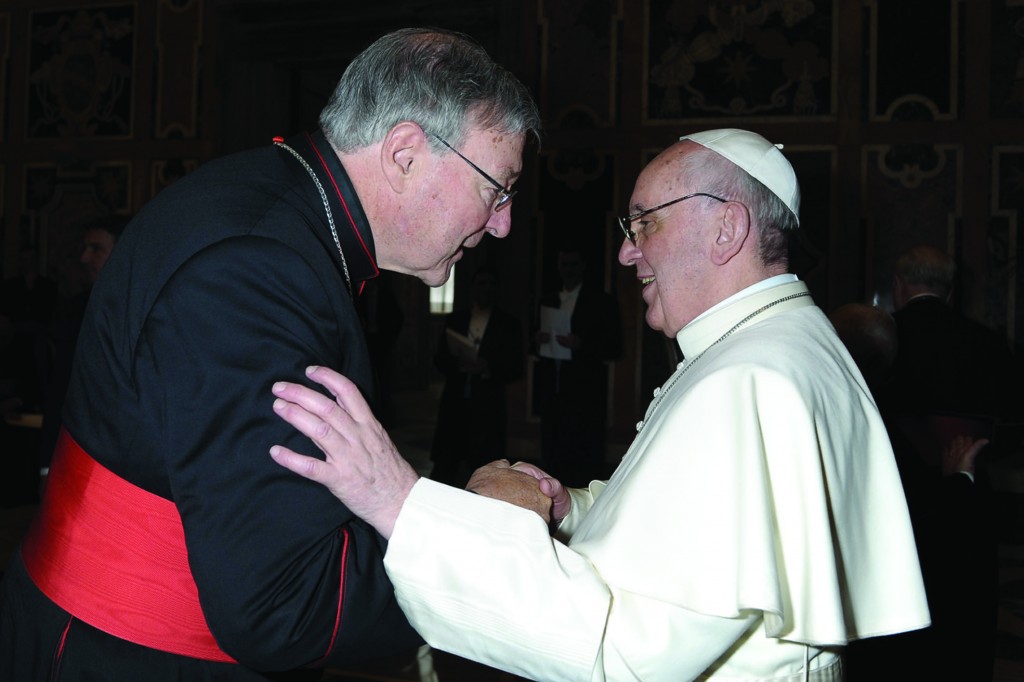
Cardinal George Pell of Sydney greets Pope Francis during his audience with cardinals March 15 at the Vatican (CNS photo/L’Osservatore Romano)
A financial battle is raging inside the Vatican. At the center of the conflict is Australian Cardinal George Pell, brought to Rome by Pope Francis to oversee the Vatican’s financial reforms. Now Pell faces tough opposition…
Is Cardinal George Pell’s reform of the Vatican’s finances in trouble? It seems so. A headline in a major Catholic weekly, the Tablet, in early May read: “Cardinal Pell Promises to See Out Term as Treasurer as Financial Battle Rages in Vatican.”
The first part of this title seems reassuring: the “man in charge” (in this case, Cardinal Pell, 74, called to Rome from Australia two years ago by Pope Francis to head up the Pope’s efforts to “reform the Vatican’s finances”) is committed to “staying the course,” to “see out his term.” Meaning? That the reform efforts he has spear-headed will turn out “all right.”
But will they? The very fact that Pell, at age 74, is now having to emphasize that he will “stay the course” is clearly a sign that something is not right. Why the need to insist so strongly that he will stay? Is it even a question?
In fact, it is — because some things have happened in the Vatican in recent weeks which have shown that Pell’s position in Rome is not as secure as it once seemed.
Despite this latest affirmation of Pell, who has seemingly held all of the reins of financial power in the Vatican for the past two years, there are other centers of financial and decision-making power in the Vatican that seem now to have escaped his control. And these centers have recently “thrown down the gauntlet” to Pell.
Until Francis in 2014 created the Secretariat for the Economy and chose Pell to head it, Vatican finances were loosely overseen by the Secretariat of State, by the Administration of the Patrimony of the Apostolic See (APSA), which dealt with real estate, personnel and assets, and by the Prefecture for the Economic Affairs of the Holy See, which audited the balance sheets and budgets of curial offices. The Institute for Religious Works (IOR), the “Vatican bank,” was a further entity, separate from the Roman Curia.
In 2014, Pope Francis established three bodies to monitor the work of Pell’s secretariat, chiefly the Council for the Economy, comprised of 15 members and charged with inspecting the budget forecasts and final budgets of all dicasteries, offices and organizations of the Holy See and Vatican City State. So Pell’s Secretariat for the Economy has subsumed most of the responsibilities once held by the Secretariat of State, APSA, and the prefecture, giving him almost total authority over Vatican finances, but his office and its work remains subject to the Council. (APSA was halved in two and now acts as the Vatican’s central bank. Although the Holy See’s real estate was initially given to Pell’s secretariat, it was returned to APSA last year.) So Pell set busily to work to bring efficiency and transparency into all aspects of the Vatican’s finances. And, to put the icing on the cake, in December, for the first time ever, he hired a professional outside auditor to double-check every Vatican budget and account…
A Bombshell Letter
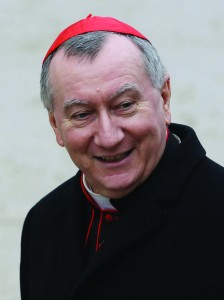
Cardinal Pietro Parolin
On Wednesday, April 20, a bombshell circular letter, dated April 12, printed on the stationary of the Vatican Secretariat of State, became public.
The letter was signed by Italian Archbishop Giovanni Becciu, the “Sostituto” or Substitute (Deputy) Secretary of State.
Becciu, who was born in Sardinia, studied canon law, and has been in the Holy See’s diplomatic service since 1984, 32 years, is the #2 in the Secretariat of State after the Secretary of State himself, Cardinal Pietro Parolin. So Becciu’s signature has a certain authority in the Curia. The letter was distributed to all approximately 120 offices of the Roman curia.
And it said that, due to problems in the contract which in December brought in the external auditor, the accounting firm PricewaterhouseCoopers (PwC), to review all of the Vatican’s financial books, the external audit was being suspended immediately.
All Vatican offices were told to stop collaborating with the auditors.
So, just over four months after the Vatican announced on December 5, 2015, that it would undergo its first-ever external audit, the Secretariat of State unceremoniously “pulled the plug” on the initiative.
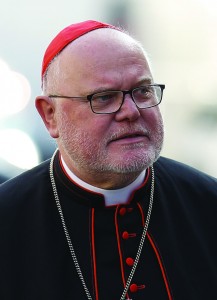
Cardinal Reinhard Marx
This dramatic move was taken without the knowledge of Pell, behind Pell’s back.
But Pell had been under attack in the Curia for some time. In February of 2015, the Italian magazine L’Espresso published a story, based on leaked receipts, alleging that Pell’s office had run up a high level of expenses in its first six months of operations. Pell defended himself vigorously: “Since March 2014 when the Secretariat was initiated, the operational costs of the Secretariat, which include some initial set-up costs, were in fact below the budget set when the office was established,” he said in a statement. “The Secretariat currently has 12 staff working on implementing new financial management routines to improve transparency and accountability.” The Associated Press reported that the leak of Pell’s receipts to L’Espresso, as well as “other documents detailing cardinals’ complaints about his efforts” was “clearly aimed at discrediting him (Pell) and harked back to the Vatileaks affair.”
This winter, Pell was attacked from another direction. He was interrogated for three nights in a Roman hotel by investigators from an Australian government commission investigating charges that he had not acted correctly decades ago in response to cases of priests sexually abusing young people in Australia.
So Pell has been “under fire” for much of the past two years. But he has always had the full support of one man: Pope Francis.
At the announcement of the halt to the audit, Pell expressed his perplexity. His spokesperson said on April 21 that Pell “was a bit surprised at the Archbishop’s letter (Becciu’s letter), but anticipates that, after discussion and clarification on some issues, the work of PwC will resume shortly.” Pell’s spokesperson underscored that “the work of the internal auditor, which covers all the areas, has not been interrupted.”
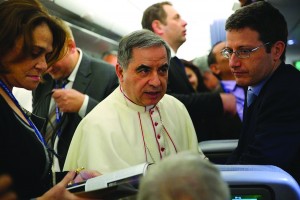
Archbishop Giovanni Becciu
“The suspension of auditing activities,” said a Vatican Press communiqúe on April 26, “is not due to considerations linked to the integrity or quality of the work initiated by PwC, let alone the intention of one or more entities of the Holy See to block the reforms in progress.”
Rather, the statement continued, “issues have emerged regarding the meaning and scope of certain clauses of the contract and their methods of implementation. Such elements will undergo the necessary examination. The decision to proceed in this way was taken after suitable consultations between the competent bodies and experts in the field.”
It concluded: “It is hoped that this phase of reflection and study may take place in an atmosphere of serenity and collaboration.”
British Vaticanist Christopher Lamb of the London-based Tablet wrote on May 2, “The public playing out of a disagreement is highly unusual for the Vatican and signifies the high level of tension inside the Church regarding attempts to overhaul Holy See finances.”
The Old Guard
So what is going on? Clearly, the Vatican “old guard” is concerned about aspects of this “external audit.” But what is at the root of this concern?
On December 5, the auditing firm was hired by the Secretariat for the Economy, which Pell heads. The Vatican said then that PwC would review the Vatican’s consolidated financial statements which include assets, income and expenses.
In 2014, Cardinal Pell had revealed to the world that he had discovered millions of euros “tucked away” in the accounts of different Vatican dicasteries. He did not say any wrongdoing had occurred, but added that Vatican departments long had “an almost free hand” with their finances. Now, he was arranging and signing a contract to audit all of those accounts.
In taking the decision to hire this outside company, Pell and his secretariat said they had worked “in tandem” with an audit committee of the Council for the Economy, headed by German Cardinal Reinhard Marx and having British Monsignor Brian Ferme as its secretary. This affirmation, evidently, is now being contested.
Becciu, in an interview with the Italian network TV2000 on April 21, said signing the contract was Pell’s mistake. “It emerged that the one who should sign this contract was not the entity that did it (the Secretariat), but the Council for the Economy,” Becciu said.
Pell’s team insists it was appropriate for Pell to make and sign the contract since his office pays PwC’s bills for their work.
Still, reportedly, both Marx and Italian Cardinal Parolin, the Secretary of State, told a mid-April meeting of the Pope’s “C-9” Council of Cardinal Advisors that they had not seen the full 60-page contract, although it was green-lighted by the Council for the Economy.
“It is not to be doubted that the autonomy and vigour of Cardinal Pell’s reforming work has created some resentment among other curial departments, and State in particular,” Ed Condon wrote on April 21 in the Catholic Herald. “After centuries of a settled, cosy, distinctly Italian way of doing things, Pell’s defiantly outsider perspective and methodology has been as jarring as it has been effective. To be clear: Cardinal Pell has many enemies in Rome who never wanted him there and who would love to see him leave.”
So, where are we? The outside audit began in December 2015. The auditors worked through January, February, March, and April — more than four months. Then, the halt was called, stopping their work.
Some observers say that the auditors were beginning to come close to some sensitive accounting issues and that this is the reason officials chose to halt the audit abruptly. Concern over the way the contract is worded and who signed it was used as a justification for calling the halt, these observers say, but that the real reason was that the audit was proceeding too far.
In a statement issued at the end of April, Pell’s office added support to this interpretation, saying that “so-called concerns” about the PwC audit “were only raised when auditors began asking for certain financial information and were finding it difficult to get answers.”
However, speaking “off the record,” some Vatican officials say there really are concerns about provisions of the contract.
These provisions seem to allow the sharing of Vatican financial data, theoretically, with PwC’s external partners, in ways these officials fear could compromise the Vatican’s autonomy as a sovereign state.
In this context, there is a question about “outsourcing” the auditing at all, versus performing it “in-house.” Last June, Pope Francis appointed a Dutch-born, London-educated Italian accountant named Libero Milone to a new Vatican post: Auditor General. Since then, Milone’s office has hired three full professional auditors along with their staffs. In theory, that Office of Auditor General was intended to be the primary agency performing annual audits on Vatican finances, while allowing external firms to be hired as necessary. So some are asking whether the PwC contract duplicates or undercuts the role of Milone and his office.
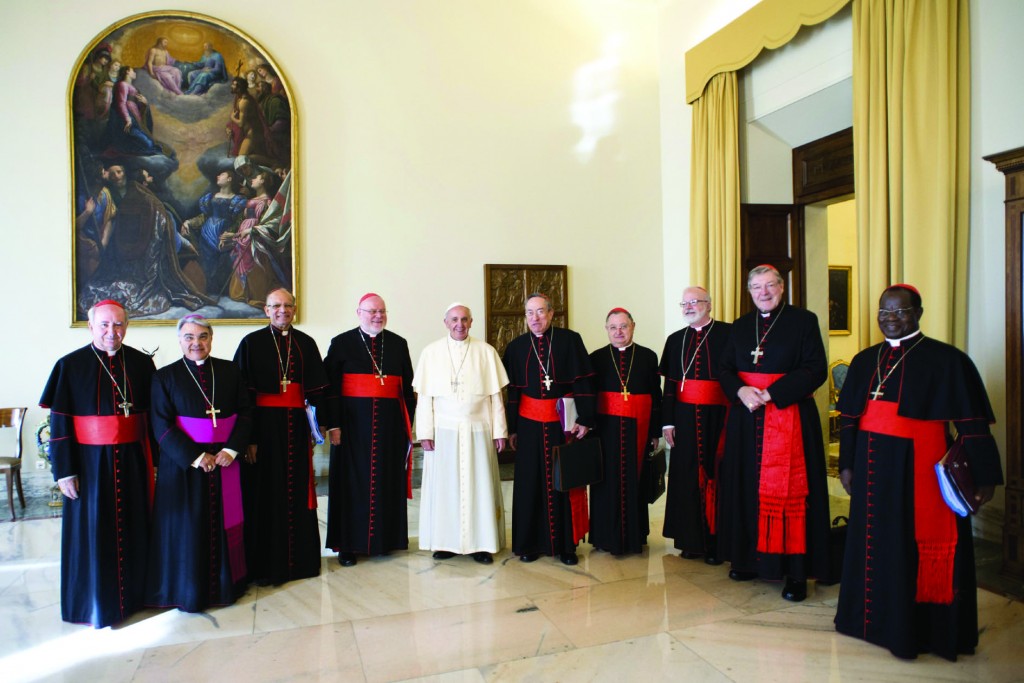
Pope Francis poses with cardinal advisers during a meeting at the Vatican Oct. 1. Eight cardinals began closed-door meetings with the pope Oct. 1 to help him reform the Roman Curia and study possible changes in the worldwide Church. Pictured from left are: Chilean Cardinal Francisco Javier Errazuriz Ossa, Italian Bishop Marcello Semeraro, secretary to the Council of Cardinals, Indian Cardinal Oswald Gracias, German Cardinal Reinhard Marx, Pope Francis, Honduran Cardinal Oscar Rodriguez Maradiaga, Italian Cardinal Giuseppe Bertello, U.S. Cardinal Sean P. O’Malley, Australian Cardinal George Pell and Congolese Cardinal Laurent Monsengwo Pasinya (CNS photo/L’Osservatore Romano via Reuters)
A deep question remains: Given that Vatican City is a sovereign state, and not a company, is it even proper that its financial books undergo external auditing? “The issue of sovereignty is crucial for the Holy See, which has fought recently to be independent of any secular power,” Italian Vaticanist Andrea Gagliarducci wrote recently. “Sovereignty has helped the Church to act independently throughout the world, without depending on any secular power, and to be able to have an independent voice on the international scene, thus being able to advocate for human rights and the common good without being accused of any partiality. Sovereignty is not just a notion: the Holy See’s sovereignty insists on the independent, albeit small, territory of Vatican City State, which like any other independent nation has its internal jurisdiction and legislation, and is involved in international relations. This sovereignty implies that the Vatican dicasteries are considered on a par with the ministries of any other country – which includes a level of confidentiality in handling their budgets. For Cardinal Pell, the real challenge is to introduce international accountability standards within a state system: to find a balance between the needs of a manager and those of a governor. When this balance is upset, Cardinal Pell’s desire for financial transparency may be stymied by fears that the Holy See could lose something of its sovereignty.”
Although Pell turns 75 on June 8 and is obligated to submit his resignation, he was given a five-year mandate two years ago, and so is expected to continue three more years until he is 78.
Inside a Church where political moves can be difficult to interpret, the decision to disrupt the audit could be viewed as an attempt to signal that Pell, despite his 5-year mandate, is on his way out.
Adding to the intrigue, veteran Vatican watcher John Allen said in a report on Catholic news website Crux that Parolin had discussed his concerns about the audit with Pope Francis and that Francis had probably approved of the Becciu letter.
Pope Francis met privately with Pell at the end of April, and is said to be aware of the entire situation. No timetable has been given on how long the “examination” of the halted auditing contract might take.

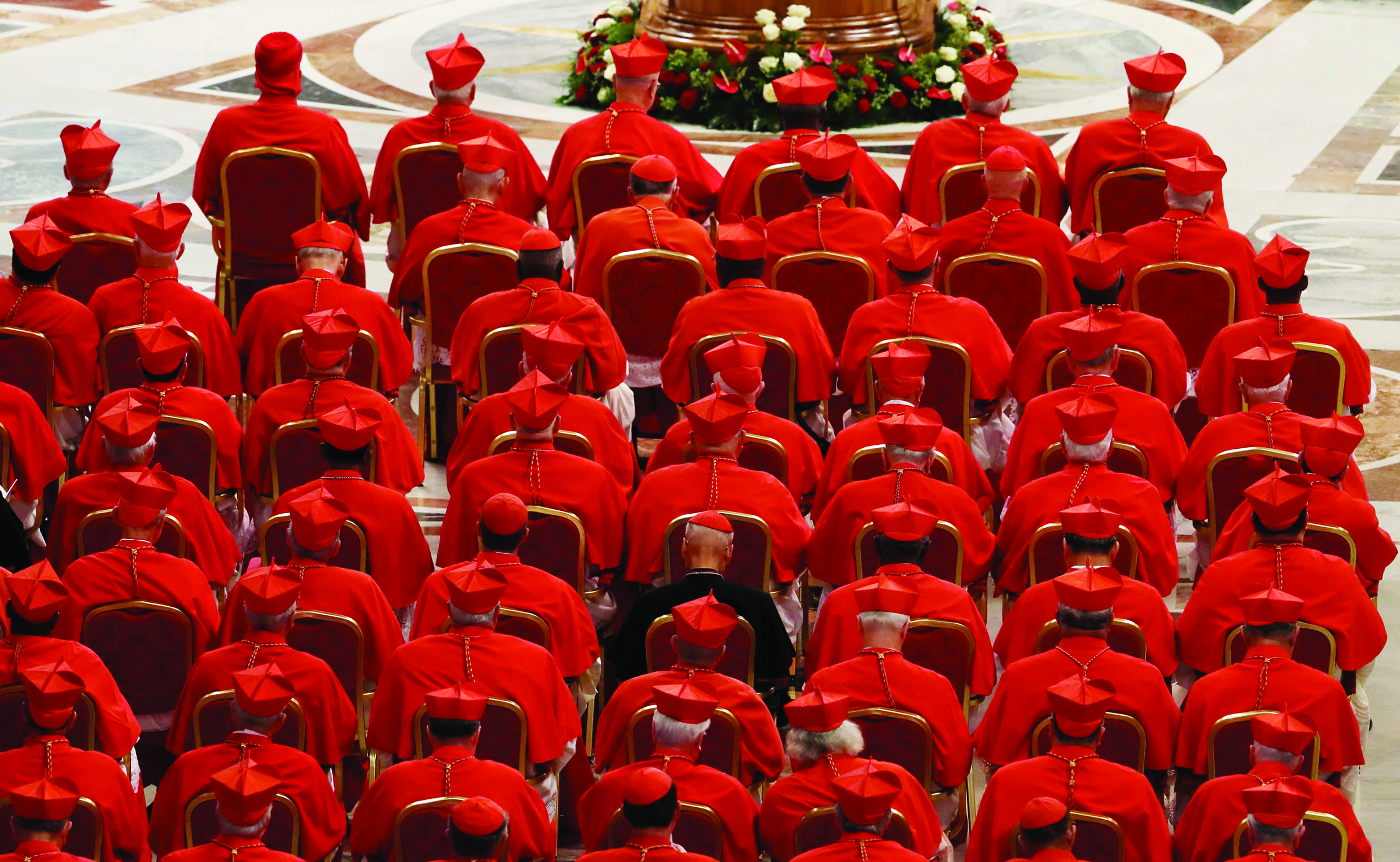
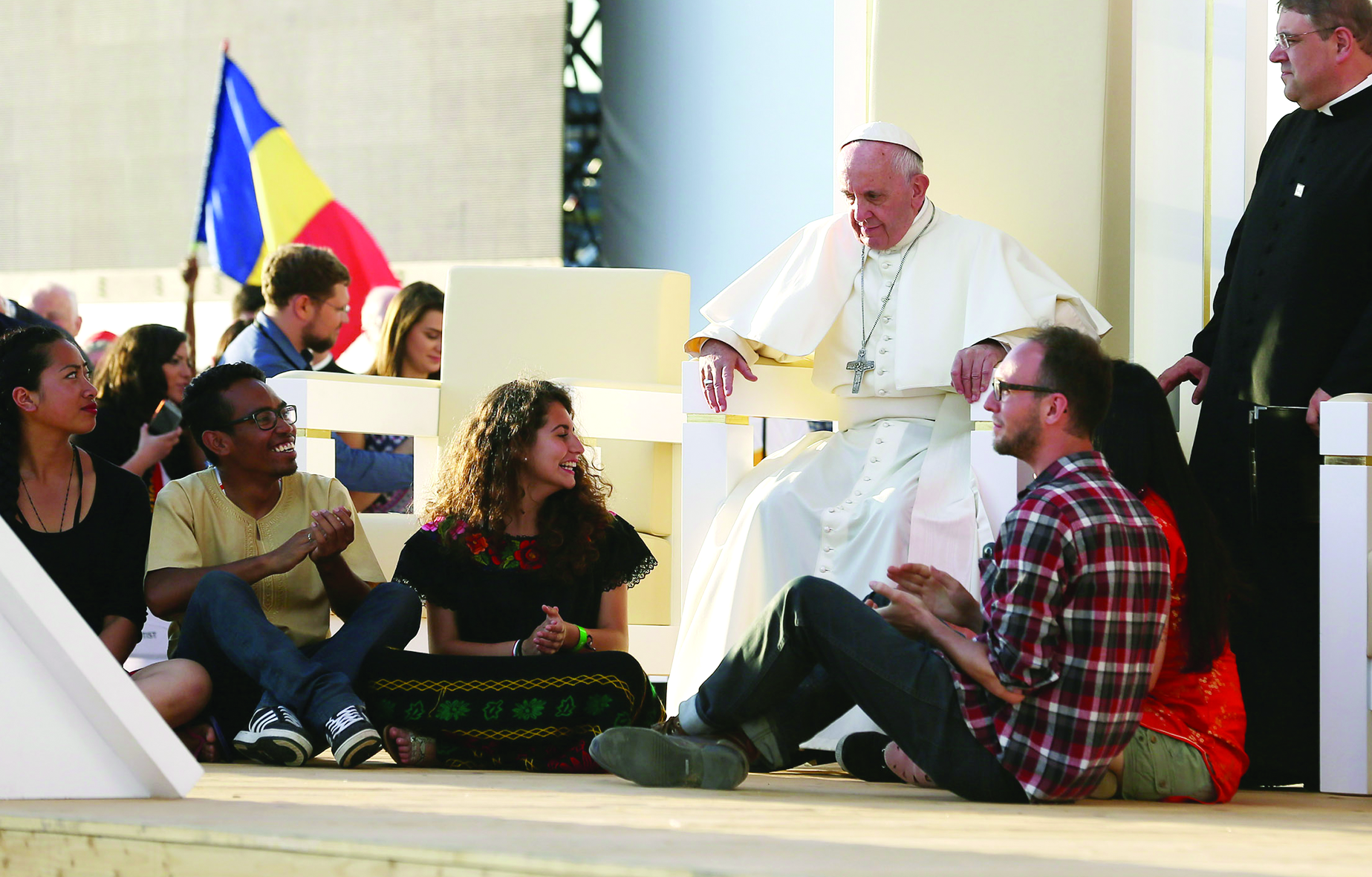
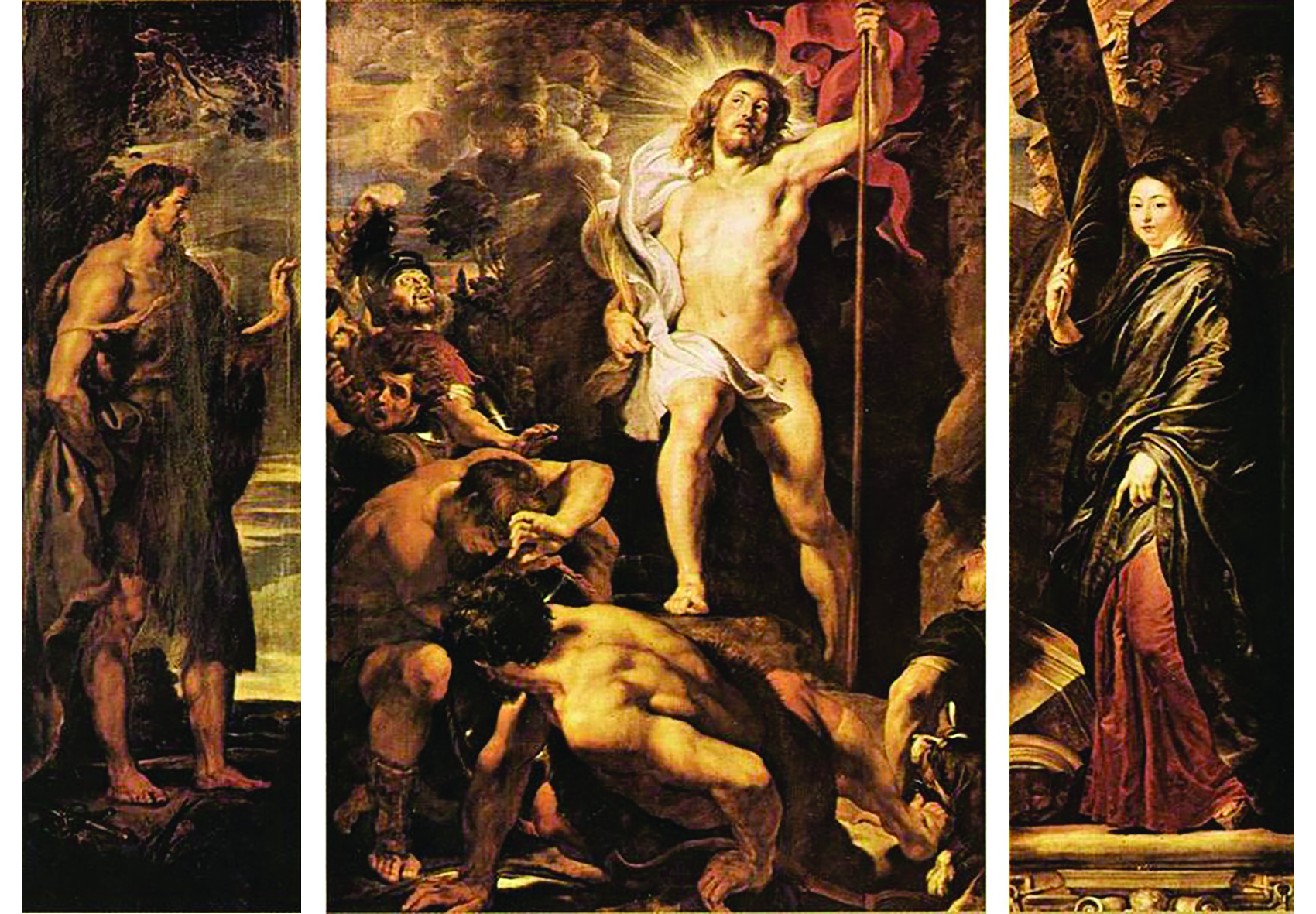


Facebook Comments